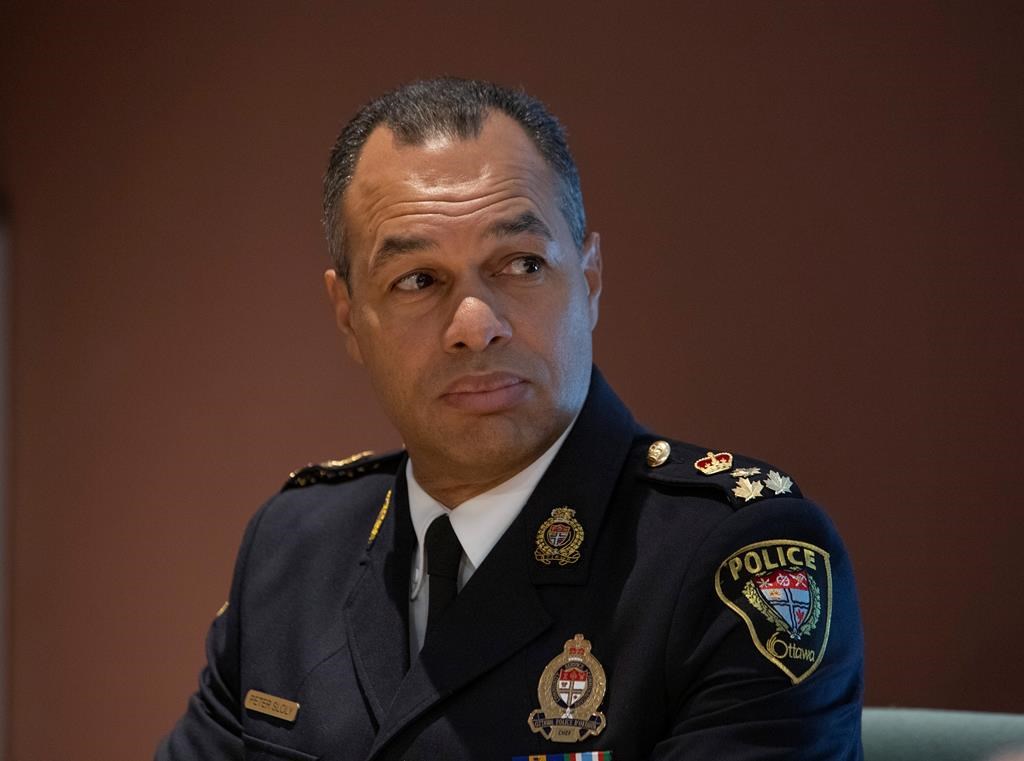Chief Peter Sloly outlined the Ottawa police force’s plan to improve its responses to mental health crises as part of the draft 2021 budget at the Ottawa Police Services Board (OPSB) meeting on Monday evening.

The topic has been back under the spotlight in the past week since an Ontario court judge ruled in the case of Const. Daniel Montsion, finding the Ottawa police officer not guilty on all charges in the 2016 death of Abdirahman Abdi.
Commenting for the first time publicly since last week’s verdict, Sloly said Monday he respects the court’s decision.

Abdi’s family said after his death that he suffered from mental health challenges. Advocates and elected officials have called into question the appropriateness of police responses to mental health crises in the years since his death following a violent arrest.
A motion at Ottawa city council on Wednesday will, if passed, ask the OPSB to hold public consultations on alternative emergency response models that are not led by police.
The OPS currently receives roughly 6,000 mental health calls annually, the “vast majority” of which are resolved safely by responding officers, Sloly said Monday.
But he acknowledged calls for change in how the city and its police force respond to mental health crises, and indicated he supports building a new system that would see police take a backseat in calls where public safety isn’t at risk.
“We all want to get out of this business (of responding to mental health calls) as much as we possibly can, but as safely and effectively as we can,” he said.

Get weekly health news
That does not, however, mean Sloly is supportive of movements to defund the police.

A motion that would have seen part of a planned increase to the force’s funding in the coming year shifted to Ottawa Public Health was soundly defeated at the Oct. 14 meeting of city council.
On Monday, Sloly came down against the idea of taking funding from policing and putting it into mental health resources without a long-term transition plan in place for responding to such calls in the near-term.
He called such proposals “irresponsible” and “dangerous.”
“Simply taking money and throwing it somewhere else does not create that capability. It will reduce the time for service, it will actually increase the silos and the lack of information sharing going on,” he said.
Part of the draft OPS budget for this coming year will see $1.5 million put towards developing a new mental health strategy with practitioners in the community.
Sloly said the new strategy would not see police at the “head of the parade,” but moved to the “middle,” providing material resources to support others in the community who have the appropriate expertise and data to improve the city’s response to mental health, drug addition and other crises that don’t necessarily warrant police involvement.
Such a model exists in Eugene, Ore., where an emergency service called CAHOOTS (Crisis Assistance Helping Out On The Streets) provides clinical intervention to crises in the city without necessarily involving a police officer presence.
The independent 24-7 service sees a medical professional and a mental health worker dispatched through the police department to handle situations involving mental illness, drug addiction or homelessness.
The OPS has a mental health unit currently consisting of a sergeant and five specially trained officers who are paired with mental health professionals from The Ottawa Hospital, but the unit is not available around the clock and much of its work involves following up with repeat callers.
Of the 24,000 calls the CAHOOTS program responded to in 2019, only 150 called for police backup.
When the CAHOOTS model was brought up during Monday’s meeting, it was pointed out that the program was launched back in 1989. Sloly emphasized that those kinds of results therefore take decades of work to achieve, and said that though he’s committed to reform, observers should not expect emergency responses to transform rapidly in Ottawa.
“This will not happen overnight. It will not happen in one budget cycle. It will not happen even during my tenure as chief of police. But it must start now and we must make those investments,” he said.
Under current budget directions from city council, the OPS budget will see a three-per cent increase in its 2021 levy and a tax bump of 1.5 per cent from growth assessments on new properties.
The OPS portion of the next year’s three-per cent tax hike will add $19 to the average urban homeowner’s tax bill in 2021, according to the OPSB estimates, for a total of $644.
Other priorities in the OPS draft budget include a continued push for diversity in recruitment, more officers for the force’s neighbourhood policing strategy, more investigators for police services targeting violence against women with a special focus on Indigenous and racialized women, and more spending to bolster mental health and wellness for officers on the job.
Sloly also said the force will undergo a “rebranding” to “better align with community expectations.”









Comments
Comments closed.
Due to the sensitive and/or legal subject matter of some of the content on globalnews.ca, we reserve the ability to disable comments from time to time.
Please see our Commenting Policy for more.